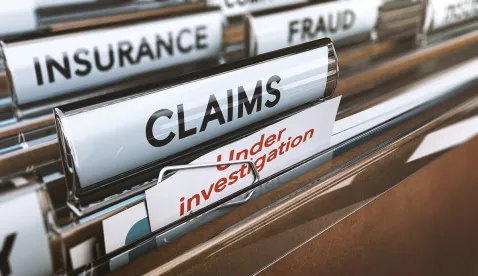A Delaware court recently granted summary judgment to a mortgage broker targeted in a federal government investigation for alleged False Claims Act violations, holding that the company’s directors and officers liability (“D&O”) insurer was required to indemnify more than $15 million in settlement costs with the U.S. Department of Justice. Guaranteed Rate, Inc. v. ACE American Insurance Company, No. N20C-04-268 MMJ CCLD (Del. Super. Ct. Sept. 6, 2021). We previously reported on the policyholder’s earlier victory in this case, in which the court held that a Civil Investigative Demand (“CID”) from federal authorities triggered the insurer’s obligation to pay defense costs under the D&O policy.
The Delaware case is one of several policyholder victories affording coverage for FCA-related claims. The parties in Guaranteed Rate cross-moved for summary judgment on coverage for the underlying settlement. The court’s 24-page opinion covers a variety of topics. The following takeaways, discussed separately below, are particularly important for policyholders to consider when assessing potential insurance coverage for FCA exposures:
-
Breaches of duties owed to the government should not trigger professional services exclusions that are applicable to the rendering or failure services to clients;
-
Policyholders seeking coverage for FCA claims should be wary of notice provisions if they are relying on documents filed under seal to satisfy notice provisions or other requirements under the policy;
-
Consent-to-settle provisions are policy- and fact-specific, so policyholders should pay close attention to ensure compliance; and
-
The court will not read a contract exclusion so broadly as to void coverage.
Professional Services Exclusion
The insurer argued on summary judgment that the D&O policy’s professional services exclusion barred coverage for the settlement because it arose out of professional services classified as “underwriting errors.” Despite having answered this question previously, the court revisited the scope of the exclusion, which bars coverage for claims “alleging, based upon, arising out of, or attributable to any Insured’s rendering or failure to render professional services.”
The insurer contended that the inquiry for whether a settlement is covered should be based on the “actual facts” revealed in the government’s investigation and not on the acts alleged in the CID. It argued that because those facts showed that the settlement was derived from the company’s underwriting errors, as opposed to other alleged quality control deficiencies, the exclusion should apply. The court held that the law of the case doctrine applied, preventing relitigating of the issue that the court had already rejected. In any event, the insurer’s argument failed because the “underwriting error” versus “quality control deficiencies” was “a distinction without a difference” where the wrongful acts alleged were for duties owed to the government, not to the mortgage borrower clients, so the professional services exclusion could not apply.
Scope of FCA Claims Involving Documents Filed Under Seal
The DOJ issued the CID in June 2019 and the parties agreed to a settlement in early February 2020, but the policyholder did not receive a copy of the redacted qui tam complaint including a retaliation claim until several weeks after the settlement was reached. The insurer argued that because the company lacked knowledge of any employment-related retaliation claims at the time of the settlement, it could not meet its burden of proving that the policy’s employment practices liability (“EPL”) coverage part was triggered. The policyholder countered by arguing that it suspected the claim, despite the complaint remaining under seal, and, in any event, the global release obtained in the settlement necessarily included any retaliation claims that may be in the qui tam action.
The court found that there was no evidence that the potential retaliation claim resulted in any increase in the settlement amount and that, because the existence of the claim was merely speculative at the time of settlement, EPL coverage was not available to cover any part of the settlement.
However, as the court noted, the entire settlement was covered and no exclusions or affirmative defenses applied, so no allocation was required. While the policyholder prevailed in obtaining coverage for the settlement, these disputes underscore the unique perils in seeking coverage for qui tam actions where the full extent of the underlying allegations may not be known to the policyholder (or the insurer). Retaining experienced coverage counsel from the outset of the claim can ensure that the claim is presented in a favorable light to mitigate risk of uncovered claims and maximize recovery for any settlements.
The Importance of Seeking Consent to Settle
The insurer also challenged the reasonableness of the settlement, arguing that the policyholder had failed to seek consent to settle with the government. The insurer contended that when the policyholder failed to seek consent, it breached the D&O policy’s consent-to-settle provision, which created a rebuttable presumption of prejudice under Delaware law. The policyholder disagreed, stating that it sought consent and that its duty to seek consent ended when the claim was denied.
The court agreed with the policyholder on this point as well. After “an insurer wrongfully refuses to defend a claim, the policyholder is permitted to enter a reasonable settlement with the claimant, provided that there is no fraud, collusion, or bad faith, and sue the insurer for indemnity … for the amount paid in settlement.” Because the policyholder sought consent to settle and created a rebuttal presumption that the settlement was reasonable, the burden fell on the insurer to rebut that presumption. Absent sufficient evidence, the court rejected the insurer’s arguments and held that coverage could not be denied for failure to comply with the notice provision.
Consent-to-settle provisions can vary between policies in the requirements they place on the policyholder. It is important to understand the consent-to-settle provision in each policy and what that provision covers. Some provisions require consent to merely engage in settlement negotiations, let alone enter into a settlement. Assessing the policyholder’s consent obligations in controlling the defense, and seeking consent where appropriate, is key to mitigate the risk of a consent defense.
Contract Exclusions Are Given a Narrow Interpretation
The insurer argued that the Contract Exclusion applied because the underlying investigation arose from breaches of loans issued by the policyholder pursuant to agreements with HUD and the VA. The policyholder responded that the Contract Exclusion was not intended to extend to regulatory violations and that adopting the insurer’s interpretation would cause the exclusion to swallow nearly the entirety of the coverage. The court agreed. In reminding the litigants that policy exclusions are construed narrowly, the court rejected application of the Contract Exclusion because the insurer’s view would effectively “void coverage.” Regardless, the CID was not based on some breach of contract action brought by either government agency, so the exclusion had no application here.
* * *
Guaranteed Rate confirms for a second time that Delaware courts continue to produce pro‑policyholder decisions on many important D&O coverage issues, including in FCA matters. The decision shows that broad coverage may be available, not only for defense costs in responding to and defending against government investigations and enforcement actions, but also for indemnification of losses in the form of settlements to resolve FCA-related exposures.






 />i
/>i

